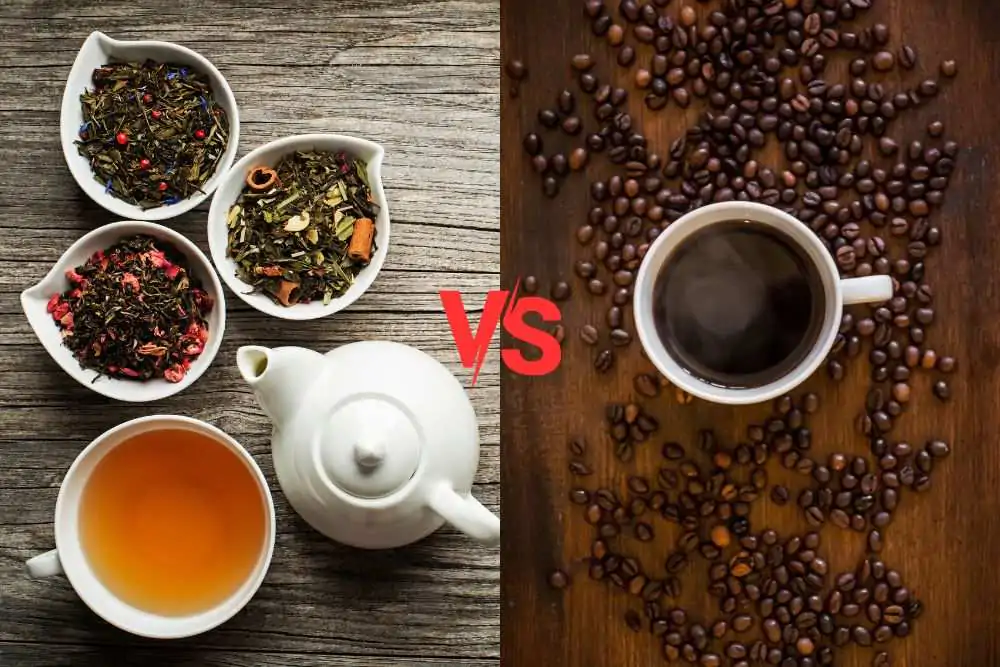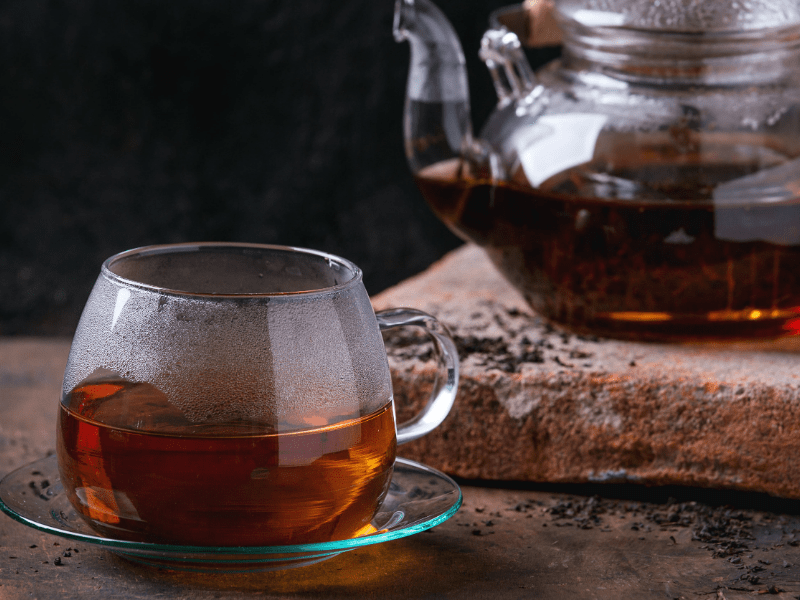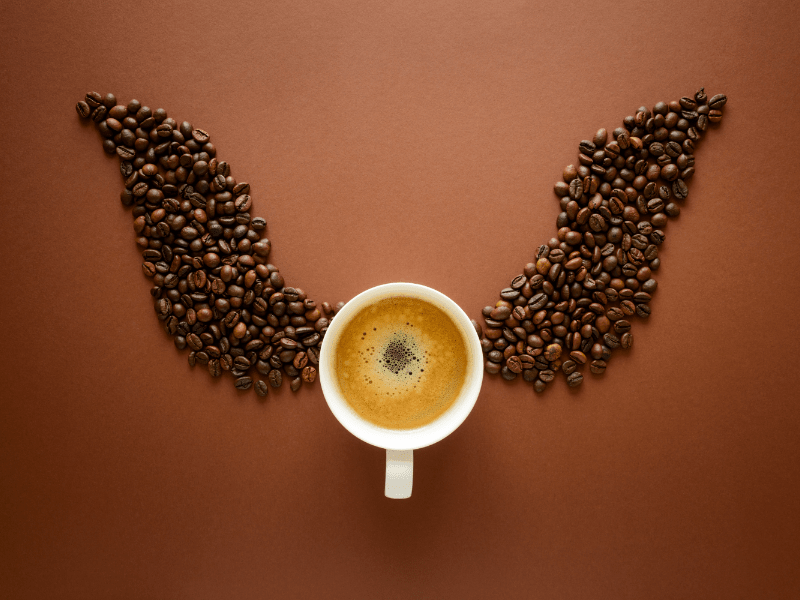Trying to lose weight? Did you know you can still drink tea or coffee without adding calories? But how and which is better? We compare tea vs coffee.

If you’re trying to lose weight, then you know that everything you put in your mouth matters.
You may be trying to decide which is better when it comes to coffee vs tea for weight loss, especially if you still need your caffeine fix to get going in the morning!
The US consumes 88.8 gallons of coffee per year compared to 34 gallons of tea, but this doesn’t mean coffee is necessarily better for weight loss.
All calories matter, so when you’re trying to lose weight, you have to count the calories you drink as well as those you eat if you hope to see the pounds melt away. Tea and coffee are two of the oldest beverages in the world, but there have been many changes to the original drinks over the years.
For instance, specialty coffees popular at cafes are usually crammed with sugar and fat, and other additives with side effects. Brewed black tea is calorie-free, but only if you don’t consume it with milk.
Hot green tea is usually drinkable without any sugar, but cold bottled green tea is often a sugar bomb mixed with berry flavors to make it more palatable to American tastes.
Other factors like the presence of vitamins and antioxidants–could make them even healthier than you think. An examination of these five factors will help you decide which is the better beverage for weight loss so you can pick the right one for your diet. You might also be wondering, what is fasting tea?
1. Calories and Sugar
Neither brewed tea nor coffee without added sugar has very many calories. In fact, an eight-ounce serving of either beverage only has two calories in total! However, if you add two teaspoons of granulated sugar to either beverage, you add an extra 32 calories to your drink. A tablespoon of sugar adds an additional 49 calories.
Therefore, if you’re just counting calories, either drink will work the same for you for weight loss as long as you do not add any sugar to your beverages.
Still, when you compare drinking tea or a cup of coffee with a sweetened soda (91 calories per eight ounces) or juice (102 calories per eight ounces), you’re saving a significant number of calories even if you can’t handle your java without a little sweet.
2. Fat
Tea and coffee are both fat-free in their natural states, so you don’t have to worry about the fat content of either beverage when you’re trying to lose weight.
It also depends on what you put into your cup. Drinking milky black tea with sugar is less healthy than a cup of green tea.
Heavy cream will add about 5.4 grams of fat per tablespoon, and half and half will add about 1.7 grams of fat per tablespoon. Commercial coffee creamers usually have about one gram of fat per container.
There are about nine calories per gram of fat, so with heavy cream, you’ll add 48.6 calories, and for half and half, you’ll add 15.3 calories per tablespoon. Commercial creamers will add nine calories to your tea or coffee.
Again, this might not seem like a lot of calories, but if you have many cups of coffee or tea per day, they will add up over the day. Each calorie you drink is one fewer calorie that you can eat!
If you want a lower risk of heart disease, don’t add anything to your coffee.
3. Vitamins

Coffee contains some vitamins, but most of them are lost during the roasting and brewing process. Still, you can get small amounts of vitamins B1, B2, B3, B5, potassium, and manganese with each cup of coffee you drink.
Most teas also lose the bulk of their vitamins during the brewing process; however, green tea is superior in that it retains many of its vitamins, including vitamins B2, C, and E, folic acid, betacarotene, saponins, and fluorine.
Therefore, when considering the vitamin content of coffee and tea, the black versions are equal, but green tea has many more vitamins than coffee. While there is no evidence that vitamins help you lose weight, they do support a healthy body, which should be the focus of any weight loss plan. In any case, adding black tea or coffee or green tea to your diet will certainly not hurt your weight loss efforts.
Tea drinkers often regularly vouch for the relaxing feel of sitting back with a cup after a stressful day too.
4. Antioxidants
Both tea and coffee contain antioxidants, which are substances that help fight free radicals in the body, which can lead to some forms of cancer. White tea contains the most antioxidants, followed by green tea, but both black tea and coffee have lower amounts of antioxidants than green and white tea.
As with vitamins, antioxidants do not directly lead to weight loss but are part of a balanced diet that can influence how your body processes foods.
Antioxidants are compounds with several health benefits. They protect your body against free radicals and play a role in combatting common diseases.
5. Caffeine Content

Caffeine is a compound that may have weight loss benefits, including the suppression of appetite and the increase of metabolism. Tea and coffee both contain caffeine, albeit in different amounts.
In their raw states, tea has more caffeine than coffee. However, it requires more coffee beans to brew a cup of coffee. That means the caffeine content in an Americano is usually higher.
Of course, the exact amount of caffeine contained in coffee or tea depends on the type and origin. Additionally, preparation plays a part as well since coffee uses higher temperatures to brew, which extracts more caffeine from the beans.
However, on average, you’ll get about 20 milligrams of caffeine from 100 grams of brewed black tea and 40 milligrams of caffeine from 100 grams of brewed black coffee. Green tea is in the middle, with more than black tea but less than coffee.
Basically, one of the key benefits of tea is its lower caffeine content.
If you prefer coffee, a high caffeine intake can also stimulate your metabolism and digestion and induce hunger. If that’s an issue for the coffee drinkers in your house, opt for decaf later in the day.
That brings us to…
6. Snacks
Consider what snacks, if any, you enjoy with a cup of tea or coffee. Both muffins and croissants, two popular coffee shop snacks, are packed with calories and easy to buy on a whim.
Any dietician will tell you that too many sugary snacks over the years can increase your chances of high cholesterol and even heart disease.
On the other hand, if you drink tea at home regularly, you can probably cultivate the right eating habits as you’re less likely to buy a snack simply because it’s right at the till.
It’s easier to brew a cup of black tea and drink it with a banana or other healthy snack when temptation is far from sight.
The Final Word: Tea Vs Coffee
If in doubt, opt for black tea or black coffee. A cup of tea is usually light in calories and contains no sugar… unless you add it.
[joomdev-wpc-pros-cons disable_title=”no” wpc_style=”wppc-view1″ title_tag=”H3″ title=”Tea” pros_title=”Pros” cons_title=”Cons” button_text=”Get it now” disable_button=”yes” button_link=”” button_link_target=”_SELF” button_rel_attr=”dofollow” verdict_text=””][joomdev-wpc-pros]
- Low calories
- Health benefits
- Less caffeine than coffee
[/joomdev-wpc-pros][joomdev-wpc-cons]
- Harsh taste
- Only green and white tea
- Less of a caffeine kick!
[/joomdev-wpc-cons][/joomdev-wpc-pros-cons]
A cup of coffee is a nice start to the day if paired with some healthy fruit. Just remember to drink it in moderation, so the caffeine content doesn’t affect your sleep.
You can drink either coffee or black tea and succeed with your weight loss plan. However, whichever one you choose should be consumed without added sugar or cream for maximum results.
In terms of vitamins, antioxidants, and caffeine, tea wins for the overall health components of vitamins and antioxidants, but coffee comes out on top for caffeine, which is the only element that has actually been shown to affect weight loss.
[joomdev-wpc-pros-cons disable_title=”no” wpc_style=”wppc-view1″ title_tag=”H3″ title=”Coffee” pros_title=”Pros” cons_title=”Cons” button_text=”Get it now” disable_button=”yes” button_link=”” button_link_target=”_SELF” button_rel_attr=”dofollow” verdict_text=””][joomdev-wpc-pros]
- Low calories
- Higher caffeine than tea
- Promotes weight loss
[/joomdev-wpc-pros][joomdev-wpc-cons]
- Only trace vitamins
- Can affect sleep
- Only in its natural state
[/joomdev-wpc-cons][/joomdev-wpc-pros-cons]
The best option is to include both coffee and tea in your diet so that you get the best that both beverages have to offer.
Whether you drink British tea, which tends to be hot, or American tea, 80% of which is consumed cold, both are better choices than sugary sodas and juices.
